
|
Astronomy Picture Of the Day (APOD)
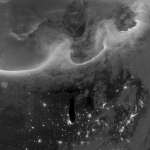 Aurorae over Planet Earth
Aurorae over Planet Earth
11.10.2012
North America at night is easy to recognize in this view of our fair planet from orbit, acquired by the Suomi-NPP satellite on October 8. The spectacular waves of visible light emission rolling above the Canadian provinces of Quebec and Ontario in the upper half of the frame are the Aurora Borealis or northern lights.
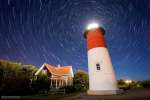 Nauset Light Star Trails
Nauset Light Star Trails
10.10.2012
In myth, Atlas holds up the heavens, but in this scene they seem to pivot around a lighthouse beacon. Photographed with a camera fixed to a tripod, the well-planned 30 minute exposure records star trails in the northern sky, reflecting the daily rotation of planet Earth.
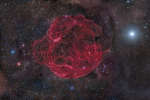 Simeis 147: Supernova Remnant
Simeis 147: Supernova Remnant
9.10.2012
It's easy to get lost following the intricate filaments in this detailed mosaic image of faint supernova remnant Simeis 147 (S147). Also cataloged as Sh2-240, it covers nearly 3 degrees or 6 full moons on the sky. That's about 150 light-years at the stellar debris cloud's estimated distance of 3,000 light-years.
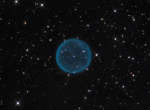 Spherical Planetary Nebula Abell 39
Spherical Planetary Nebula Abell 39
8.10.2012
Ghostly in appearance, Abell 39 is a remarkably simple, spherical nebula about five light-years across. Well within our own Milky Way galaxy, the cosmic sphere is roughly 7,000 light-years distant toward the constellation Hercules.
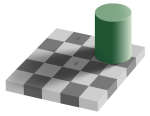 The Same Color Illusion
The Same Color Illusion
7.10.2012
Are square A and B the same color? They are! To verify this, either run your cursor over the image or click here to see them connected. The above illusion, called the same color illusion, illustrates that purely human observations in science may be ambiguous or inaccurate.
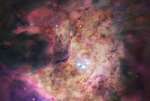 At the Heart of Orion
At the Heart of Orion
6.10.2012
Near the center of this sharp cosmic portrait, at the heart of the Orion Nebula, are four hot, massive stars known as the Trapezium. Gathered within a region about 1.5 light-years in radius, they dominate the core of the dense Orion Nebula Star Cluster.
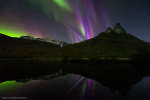 Aurora and Fireball Over Norway
Aurora and Fireball Over Norway
5.10.2012
What's happening behind that mountain? A convergence of variable sky spectacles. One night in mid-September near TromsЬ, Norway, high red aurora could be seen shimmering through lower green aurora in a way that created a striking and somewhat unusual violet glow.
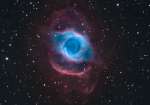 NGC 7293: The Helix Nebula
NGC 7293: The Helix Nebula
4.10.2012
A mere seven hundred light years from Earth, in the constellation Aquarius, a sun-like star is dying. Its last few thousand years have produced the Helix Nebula (NGC 7293), a well studied and nearby example of a Planetary Nebula, typical of this final phase of stellar evolution.
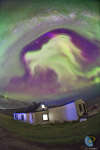 Goat Aurora Over Greenland
Goat Aurora Over Greenland
3.10.2012
Sometimes it's hard to believe what you see in the sky. During the Shelios Expedition to Greenland in late August, even veteran sky enthusiasts saw auroras so colorful, so fast changing, and so unusual in form that they could remember nothing like it.
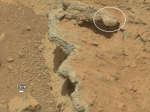 An Ancient Stream Bank on Mars
An Ancient Stream Bank on Mars
2.10.2012
Fresh evidence of an ancient stream has been found on Mars. The robotic rover Curiosity has run across unusual surface features that carry a strong resemblance to stream banks on Earth. Visible in the above image, for example, is a small overhanging rock ledge that was quite possibly created by water erosion beneath.
|
January February March April May June July August September October November December |
|||||||||||||||||||||||||||||||||||||||||||||||||